Meo Vac Market: Discover Ha Giang’s Cultural Gem in Vietnam
Meo Vac Market, tucked away in Ha Giang Province, is a hive of local activity and cultural interaction. Every Sunday, this busy market comes alive as ethnic minorities from the nearby hilly areas trade products. Meo Vac Market is not only a place to buy goods but also a window into the rich customs and cultural diversity of northern Vietnam. Let MOTOGO Tours explore this local market.
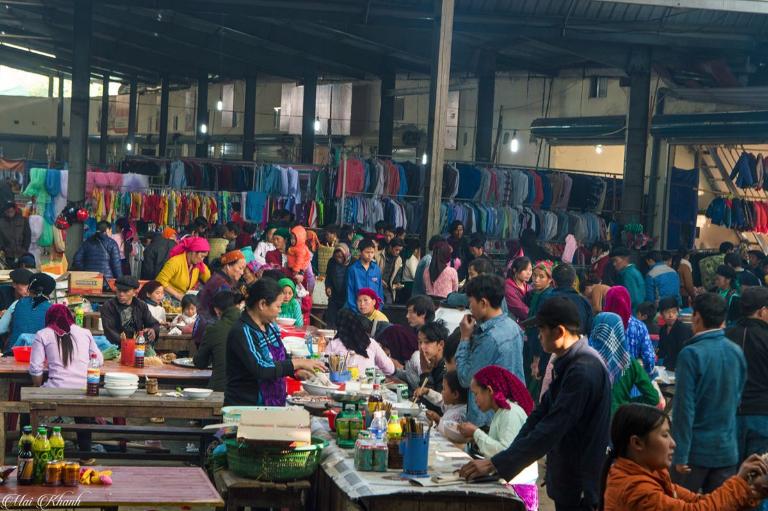
Historical Background of Meo Vac Market
Dating back several centuries, Meo Vac Market is one of the most famous local markets in Ha Giang. Traditionally, people from far-off villages gather to trade things, catch up on news, and deepen social ties there. Although the things sold have become more diverse throughout time, the market has stayed true as a cultural center.
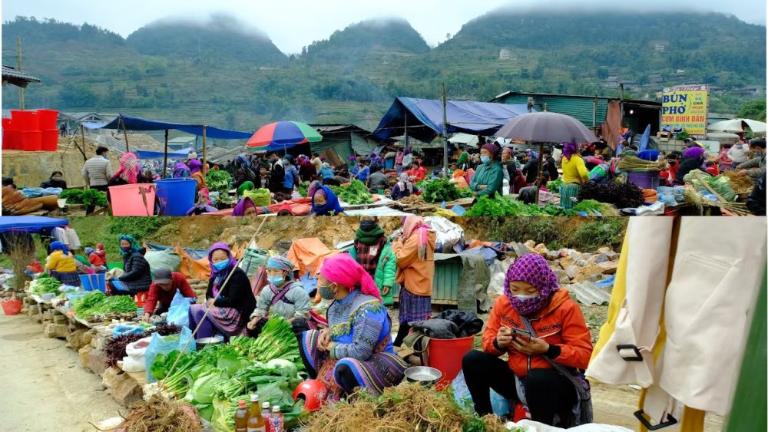
Location and Accessibility
Situated in Meo Vac District, Ha Giang Province, the market is one of must-visit destinations in Ha Giang, surrounded by breathtaking scenery with twisting rivers and tall mountains. The site itself accentuates the appeal of the market by offering breathtaking vistas that make the travel as pleasurable as the final destination.
How to Get There
Approaching Meo Vac Market might be an adventure unto itself. About 300 kilometers separate the market from Hanoi, and visitors usually explore the mountainous roads on a bus or hired motorbike. The excursion is noteworthy because of the amazing views that the meandering passes—including the well-known Ma Pi Leng Pass—offers.
Best Time to Visit
The best time to visit Meo Vac Market is during the dry season, from October to April. The milder temperature makes the trip more pleasant, and guests may take in the breathtaking surroundings free from the obstacle of rain. Sundays are the busiest days since the market is running full tilt and draws both visitors and traders.
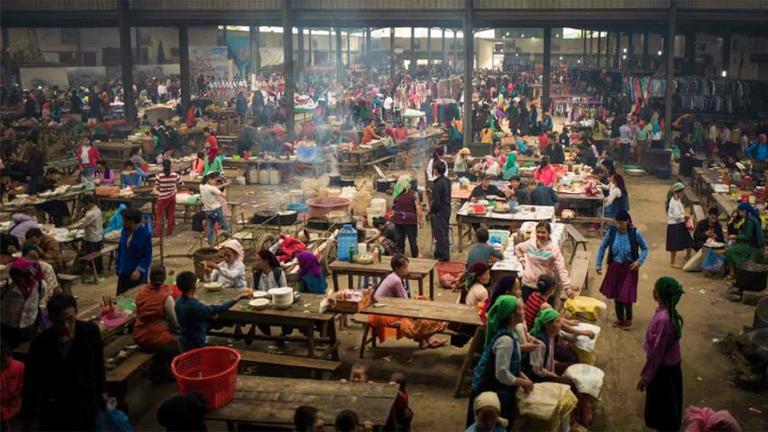
>>> Explore: When is the Best Time to Visit Ha Giang? Discover the Ideal Seasons
The Unique Atmosphere of Meo Vac Market
From the time guests enter, the Meo Vac Market environment is a sensory feast that enthralls them. For the weekly Sunday market, hundreds of traders, residents, and visitors mix to create the buzz of activity filling the air. This energetic environment celebrates cultural variety still alive in northern Vietnam, not only about trade products.
The Bustling Vibe
Early on Sunday morning, the market opens as traders start to arrange their displays. Local residents haggle over pricing and catch up on the week’s events, creating a bustle of chatter. The energetic environment is enhanced by the sound of laughter, the clang of metal tools, and the cry of sellers promoting their products. Here you may experience the pulse of local life: energetic, chaotic, and full of character.
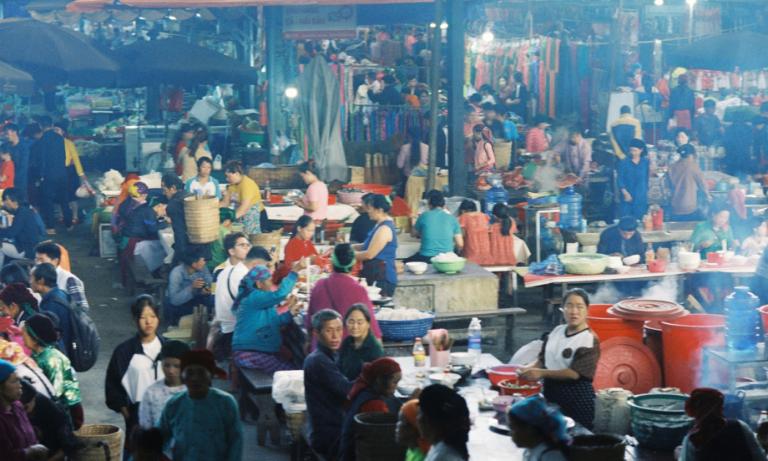
There is a feeling of order among the turmoil even as the market gets packed; areas for many kinds of goods, from fresh food and handicaps to cattle, give structure. The view is much the more beautiful when one sees vividly colored residents in traditional clothing straying over the crowd.
Ethnic Groups and Cultural Diversity
Meo Vac Market’s ethnic variety is among the most amazing features of it. Among the several ethnic groups—including the H’mong, Tay, Dao, Giay, and Lo Lo people—the market provides a gathering place. Every group adds their own special cultural components, which show up in the different clothes, language, and even products they market. The H’mong people’s rich embroidery and vivid colors contrast with the more muted tones of the Tay or the unique headpiece of the Dao. This ethnic variety produces a visually arresting and culturally enriching tapestry.
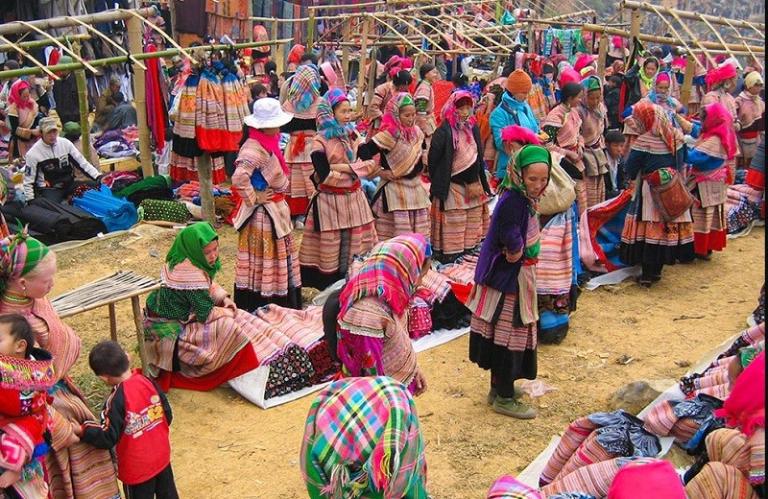
Aromas and Flavors of the Meo Vac Market
From food booths strewn around the market, the seductive smells of local cuisine permeate the air. From grilled meats sizzling over open flames to steamy bowls of “thang co,” every shop presents a different taste of Ha Giang. The aroma of freshly made sticky rice, roasted corn, and aromatic herbs will surely pull you towards the food sector of the market, where you may taste real local cuisine straight in front of you.
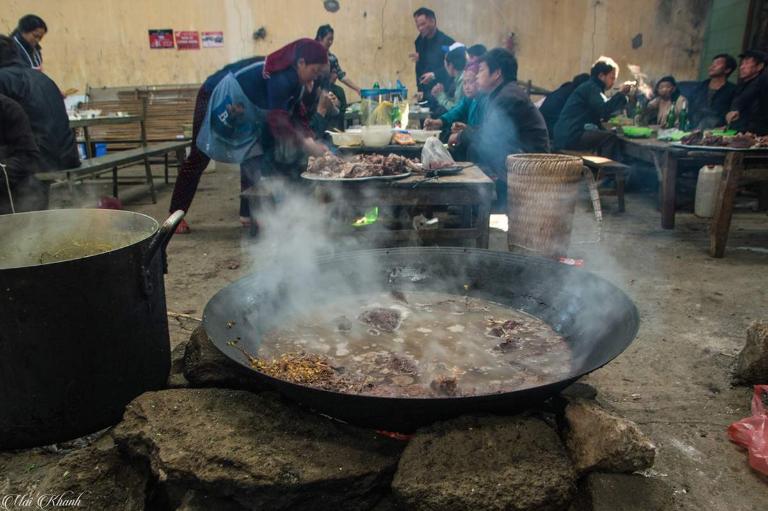
Products and Goods Sold at Meo Vac Market
Reflecting the cultural diversity and traditional way of life of the area, Meo Vac Market is a treasure store of distinctive items and goods. From handcrafted goods and fresh food to cattle, every item on display offers a peek into the life of the nearby populations.
Traditional Handicrafts
Meo Vac Market has one of the best selections of traditional handicarticles. Local artists present handcrafted objects including handwoven fabrics, silver jewelry, handcrafted garments with finely embroidery, and wooden carvings. Made utilizing age-old techniques reflecting the cultural identity of the several ethnic communities, these handicaps typically highlight the talents passed down through generations.
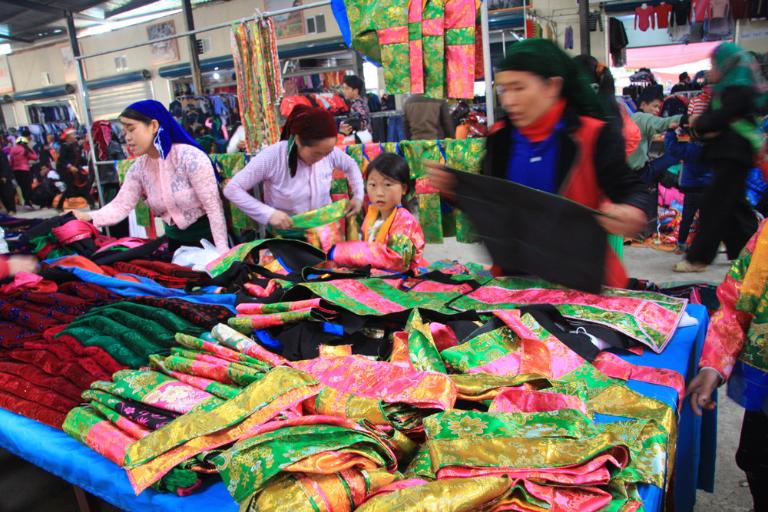
Fresh Local Produce
From fruits, vegetables, and herbs to locally made honey and maize, the market provides a range of fresh local goods. The vast, rich valleys all around Meo Vac offer perfect farming conditions, which produces excellent, organic food. Here among the unusual objects are:
- Ha Giang Honey: Rich in floral taste, Ha Giang honey is gathered by bees who browse on wildflowers in mountainous regions, so reflecting their unique flavor. It’s a common item among guests looking for locally produced natural goods.
- Corn Wine: Made from locally cultivated corn, this ancient alcoholic beverage is a mainstay of many ethnic diets. Considered a sign of friendliness in the area, corn wine tastes strongly and uniquely.
- Medicinal Herbs: Mountains of Ha Giang house a range of medicinal herbs utilized in traditional treatments. Usually sold dried in the market, these herbs are used traditionally and have health advantages known to the residents.
Livestock Trading
One of the most interesting sections of Meo Vac Market is the cattle trading one, which provides a window into the agricultural way of life of the nearby residents. Farmers abound in this area bringing their animals—cows, pigs, chickens, goats, and occasionally even horses—to sell or trade. Seeing animals traded and negotiated for accentuates the rural appeal of the market and highlights the value of cattle in the local economy and culture.
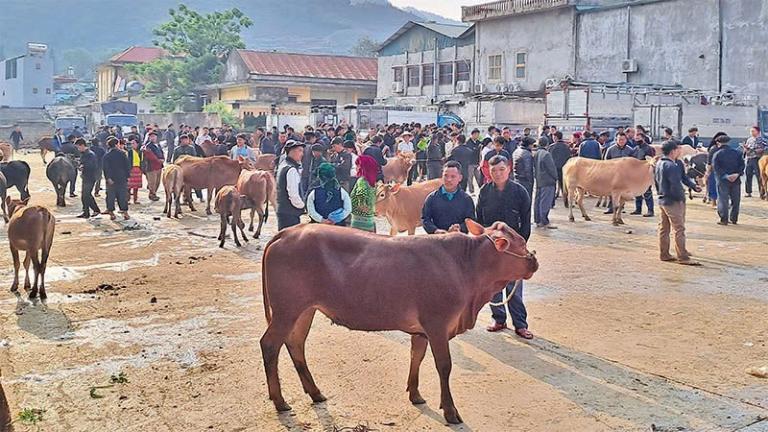
Tools and Everyday Essentials
Apart from food and handicaps, Meo Vac Market is where residents come to get daily needs. This covers daily use domestic items, cooking tools, and farming implements. Usually simple but robust, the tools supplied on the market are meant for the demanding life of mountain farming. For local agricultural activities, for instance, traditional sickles, knives, and bamboo baskets are widely used and still very vital.
Animal Skins and Traditional Musical Instruments
Apart from cattle, some merchants provide animal skins and traditional musical instruments composed of natural resources. Cultural events, celebrations, and rites call for these objects. Buffalo horns, for instance, are carved into musical instruments or ornaments, while animal skins might be used to create drums. Buying these classic instruments as mementos lets guests carry a bit of the cultural legacy of the area home.
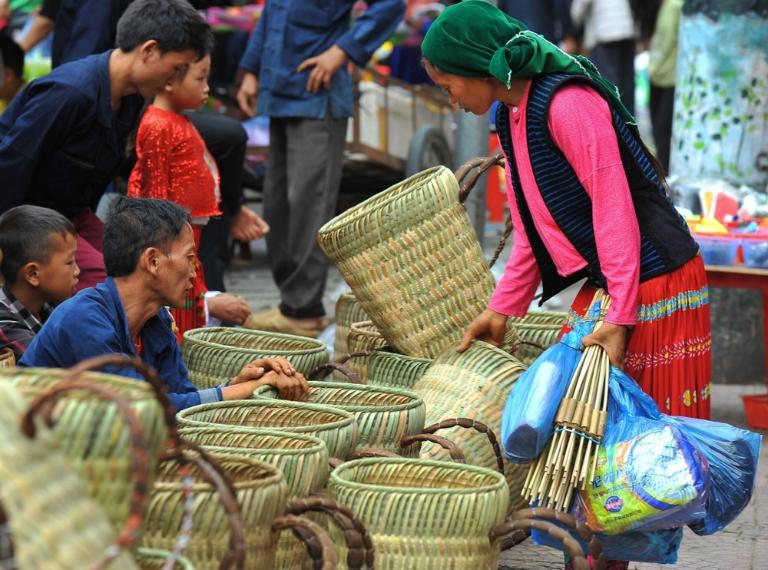
Nearby Attractions to Explore
There are various neighboring sites that one should not overlook while visiting Meo Vac Market. Traveling in the nearby places with their historical importance and natural beauty enhances the trip.
Ma Pi Leng Pass
Not only a mountain road, Ma Pi Leng Pass is a renowned path spanning over 20 kilometers between Dong Van and Meo Vac. Among Vietnam’s “Four Great Passes,” it is renowned for its tough, twisting road that clings to sheer mountains. About 1,500 meters above sea level, the pass provides amazing views of deep, twisting valleys and soaring limestone mountains.
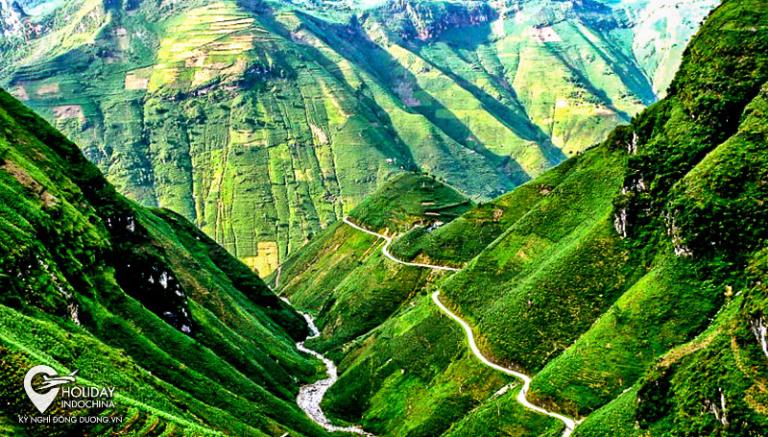
Nho Que River
One of the most lovely and famous rivers in Vietnam, the Nho Que River flows elegantly across Ha Giang’s deep valleys. Its emerald-green seas cut across the limestone mountains to provide a stunning contrast against the surrounding untamed terrain. Offering a distinctive viewpoint on the geography of the region, the river flows through Tu San Valley and along the base of Ma Pi Leng Pass. Kayaking or boating the Nho Que is highly advised for those looking for a closer view of the river.
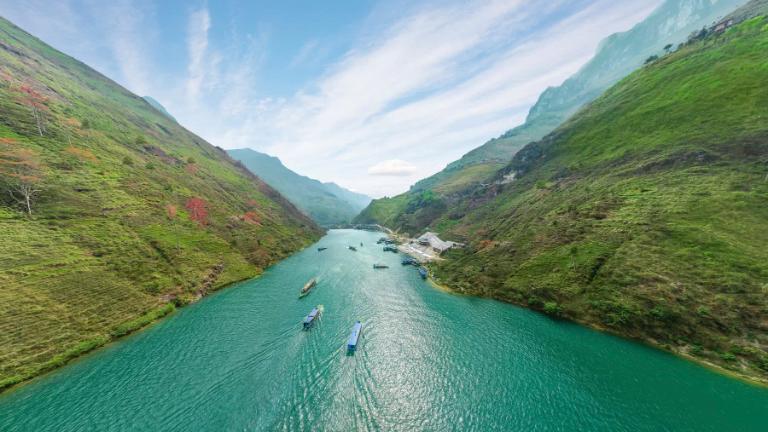
Tu San Alley
Rising almost 800 meters above the Nho Que River, Tu San Alley is regarded as the deepest canyon in Southeast Asia. Situated next to Ma Pi Leng Pass, this natural beauty provides an amazing perspective that catches Ha Giang’s pristine and raw beauty. The dramatic scene created by the tight canyon and sheer granite cliffs seems nearly alien. The path across Tu San Alley highlights the grandeur of Vietnam’s northern frontier and the might of nature. For everyone touring the Ha Giang Loop, this is absolutely must-see.
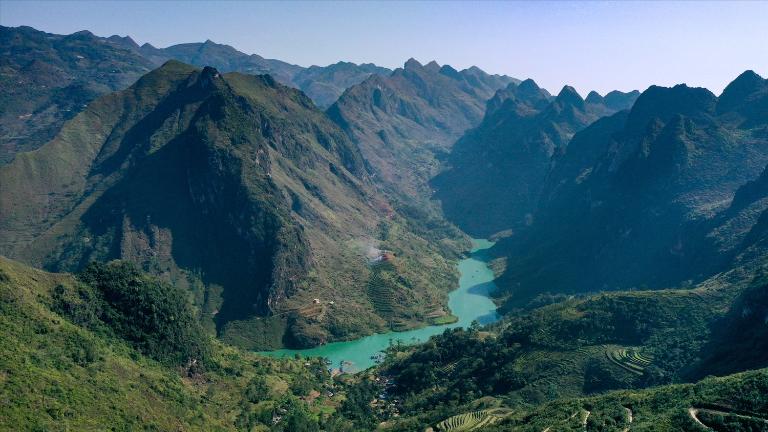
Meo Vac Market is much more than a marketplace; it is a cultural institution that plays a crucial role in preserving the heritage and traditions of Ha Giang’s ethnic communities. The market’s cultural, social, and economic significance make it an essential destination for anyone exploring the northern highlands of Vietnam.
Related posts:
- Dong Van Market: Discover the Cultural Heart of Ha Giang
- The Unique Charm of Khau Vai Love Market in Ha Giang
- Yen Minh Pine Forest: A Hidden Gem in Vietnam’s Highlands
- Pho Bang Town: Discover the Hidden Cultural Gem of Ha Giang
- Lung Tao Village: A Must-Visit Destination for Buckwheat Flower Viewing









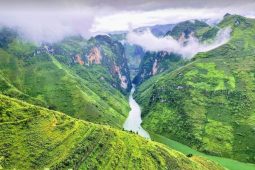
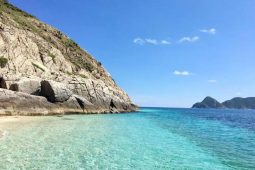
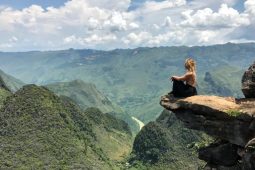
Be the first to comment!